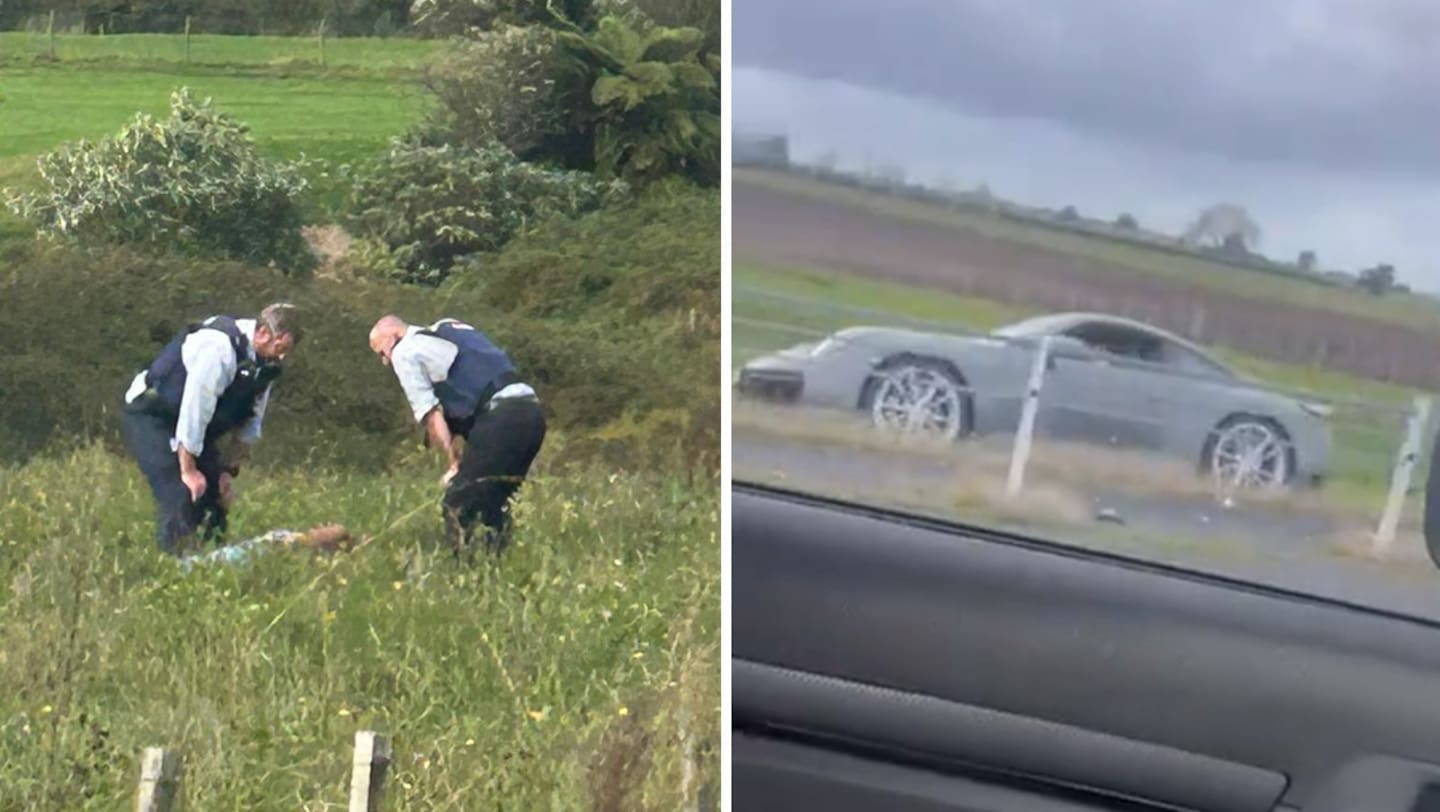
- Sifa Tevita, 37, was sentenced to two years and seven months for a police pursuit in a $249,000 Porsche stolen from a posh Auckland neighbourhood.
- His crime spree included burglary and a 100km chase in which he drove on the wrong side of the Waikato Expressway.
- Tevita was previously expelled from Australia after a murder-for-hire plot in 2005.
A New Zealander who was expelled from Australia following a murder-for-hire plot in which he cut the throat of a wheelchair-bound man who suffered cerebral palsy is back in prison – this time on this side of the Tasman for a 100km police pursuit in a stolen $249,000 Porsche.
Sifa Tevita, 37, drove the wrong way on the Waikato Expressway and nearly hit an ambulance during the hour-and-a-half chase, which at one point had 20 police vehicles following him. The April 2023 pursuit ended with him getting out of the damaged vehicle, which had lost its tyres, and relieving himself in front of officers.
“You were lucky that you didn’t kill or maim others or yourself,” Auckland District Court Judge Peter Winter said this week as he ordered a sentence of two years and seven months’ imprisonment.
Tevita, who was initially on electronically monitored bail, had been set for sentencing seven months ago after pleading guilty to burglary, reckless driving and failure to stop for police. But that hearing was cancelled after he didn’t show up to court.
He had removed his ankle monitor and started offending again, the court was told.
Five days after the aborted hearing, he was spotted in Auckland Central in a much less flash - but also stolen - $5000 Mazda station wagon containing burglary tools such as bolt cutters and a crowbar. He had again driven recklessly, accelerating away and driving on the wrong side of the road while nearly hitting a construction worker. He abandoned the car on foot and ran through multiple properties in a continued effort to escape but was tracked by a police dog.
At this week’s hearing, as he was sentenced for the original set of charges and the new ones, he was no longer given the benefit of the doubt. He’s spent recent months in custody awaiting the new sentencing date. He was accompanied by two guards throughout the court appearance – giving the finger to a Herald photographer and briefly pulling his shirt over his face as it began before settling in to listen to the judge and lawyers.
“That return [to New Zealand] has been rocky and, unfortunately, his matters before the court have marked that,” defence lawyer Harvena Cherrington said.
‘Unpredictable’ public danger
According to court documents, Tevita’s crime spree began in affluent Auckland suburb Parnell about 2am on April 16 last year when he and co-defendant Ronald Neilson cased out a gated residence where the 2021 model Porsche 911 Carrera 4S and a $50,000 Land Rover Discovery were parked.
They returned at 4am and removed the keys for both vehicles from within the residence.
Sifa Tevita, who was deported from Australia as a 501 after cutting a person's throat in a murder-for-hire plot, appears in Auckland District Court for sentencing on a raft of new charges. Photo / Dean Purcell
Neilson, who is set for sentencing in January after also having not appeared for his initial sentencing date, used the Range Rover to smash through the property’s security gate and Tevita followed in the Porsche.
Police spotted Tevita heading towards Hamilton that same day after he attempted to purchase fuel for the sports car at a Waihī petrol station about 7.30am. At that point, Neilson was in the passenger seat.
Tevita realised police were on to him when they attempted to spike the Porsche’s tyres. When that attempt to stop him didn’t work, police pulled directly behind him with red and blue lights flashing. He sped away.
“The defendant has entered the Waikato Expressway the wrong way before driving south in the northbound lane,” court documents state. “He proceeded to travel 7km down the wrong side of the Expressway during which time he swerved toward police units travelling northbound and narrowly avoided colliding with an ambulance.”
He then exited the motorway o nto Te Rapa Rd, Horotiū, driving at an estimated speed of 80km/h despite the two right tyres of the Porsche having completely deflated at that point.
“As the defendant drove south along Te Rapa Rd, he again swerved towards a police unit and regularly travelled on the incorrect side of the road, forcing members of the public to the side of the road,” the police narrative continued.

Sifa Tevita was behind the wheel of a Porsche that was seen driving the wrong way along the Waikato Expressway. Photo / Ashlee Garrett
“At one stage the defendant accessed The Base shopping mall carpark, forcing shoppers to take refuge inside the shops, such was the manner of driving.”
He then returned to Te Rapa Rd, continuing to drive on the wrong side in an effort to shake police, the agreed summary of facts states. He travelled an estimated 80km/h in a 50km/h zone while again swerving towards members of the public, police noted.
“At about this time the two deflated tyres fell off the vehicle, causing the defendant to drive on the rims,” authorities have noted, explaining he continued to avoid arrest by swerving at police or driving around them on the grass verges before again entering the wrong side of the Waikato Expressway.
“Due to the defendant’s manner of driving and unpredictable behaviour police were required to stop both north and southbound lanes of traffic to reduce the risk to the public,” authorities said.
Tevita continued to drive another 12km, including “extended periods” where he remained on the grass verge, until encountering “a considerable police roadblock” at the Taupiri interchange.
Seeing the trap that lay ahead, Tevita reversed down the motorway and then exited between a wire barrier and a roadside fence in an effort to get around the roadblock.
“The defendant managed to drive a further 500m before eventually sliding into a fence, becoming stuck and fleeing from police [on foot],” court documents state.
“When arrested in a nearby paddock the defendant refused to provide an explanation, choosing instead to urinate in front of them.”
‘Felt his throat being cut’
The Waikato Expressway chase wasn’t the first – or even, arguably, the most bizarre - crime that Tevita has been in the public eye for.
In 2005, at just age 18, he was handed a precedent-setting 18-year prison sentence in a Brisbane courtroom after pleading guilty to slashing the throat of a young man in a wheelchair and stabbing him three times in the back.
The judge stipulated he serve at least 80% of the attempting to kill sentence before eligibility would set in for him to apply for parole.
Tevita was 17 years old at the time of the May 2004 attack, which he said he participated in because victim Michael Birch’s roommate - Benjamin Luke Janz, who also suffered from cerebral palsy - had promised him $500,000 to carry it out.
Birch was left for dead but survived the attack, according to court documents from Australia.
“Mr Birch heard someone running into his bedroom,” the Queensland Court of Appeal recounted while considering if Tevita’s sentence was manifestly excessive.
“A hand came across his face pulling his head back, and he felt his throat being cut. After that, the applicant came back and stabbed him.”
Sifa Tevita appears in Auckland District Court for sentencing on a raft of charges including a 100km police pursuit in a stolen Porsche. Photo / Dean Purcell
“Are you right to use this?” the victim’s roommate had asked Tevita a short time earlier after handing him a folding knife with a 10cm blade.
“Do it now,” he added.
Janz, who would later receive a 10-year sentence, was described as the more intelligent of the two co-defendants.
“It may be that because of his own disability, Janz was unable to carry out the killing himself and so engaged the applicant to do it for him,” the Court of Appeal noted.
Because of the victim’s disability, he had been in a wheelchair his whole life and was unable to defend himself, the court also noted.
He called police but was unable to speak due to the neck wound. He then wheeled himself outside his flat, the bloody sight prompting neighbours to call for an ambulance.
“The result for Mr Birch has been tragic,” the Court of Appeal justices wrote.
“Despite his disability, he had previously been able to live an independent life. He was a disc jockey for ... a broadcasting system that serves the Children’s Hospital. Remarkably, he was also learning to fly an aeroplane.
“Now he can do neither of these things. Because of injuries to his larynx, he is unable to speak above a whisper. He is at constant risk of choking and has to have his food cut up for him to eat.
“It is painful to cough; he is vulnerable to colds, flu and throat infections; and he suffers continuous back pain from the stabbing inflicted on him. He now requires a full-time carer and his mother has had to resume living with him to look after him.”
In determining if the sentence was manifestly excessive, the court noted that “there is obviously not much to be said in mitigation of the applicant’s terrible deed”, adding that it was “cruel and merciless and carried out for money”.
Youth was a factor to consider, but “it does not require much maturity to know not to commit such an awful offence, even though it is clear from the psychologist’s report that the applicant is lacking in ordinary intelligence and insight”, the Court of Appeal found. It dismissed the appeal.
Tevita and his co-defendant were also ordered in 2008 to pay $75,000 in compensation – the maximum allowable under Queensland law – to the victim, according to the Brisbane Times.
Fresh start in NZ
Ahead of this week’s sentencing hearing, police asked the owner of the stolen vehicles if she wanted to give a victim impact statement. She said she was too afraid, worried the defendant would have access to the document and find out her identity.
She also declined to seek reparation, police prosecutor Yara Alrubayee said, “as she feels it would push the defendant further into a life of crime”.
Alrubayee ticked off a list of aggravating features of the offending, including that it involved a residential burglary, it was pre-meditated and the reckless driving was during school holidays when roads were particularly busy.
Sifa Tevita's defence lawyer told a court her client wishes "to move forward positively". Photo / Dean Purcell
The judge agreed the victims still appeared to be traumatised and for good reason.
“You violated the sanctity of their home address while they were there,” he said.
The defence didn’t disagree with the aggravating factors but told the judge that Tevita has used his time wisely since he was returned to custody.
“He has thought of what his life would look like outside prison and formulated a safety plan,” Cherrington said, adding her client penned an apology letter that he hopes will be shared with the victim at some point. “He does wish to move forward positively.”
Both sides proposed a three-year starting point for the burglary charge, which Judge Winter endorsed.
The judge increased the sentence by one month for the driving offences that followed the burglary, five additional months for the similar offending that occurred this year, two months for his criminal history and two months for having offended while on bail.
He also added three months for breaches of the Returning Offenders Order – temporary, parole-like conditions placed on deportees with the aim of helping reintegration while safeguarding the public. The conditions were placed on Tevita when he returned to New Zealand in May 2022 and they expired two years later.
But the judge also allowed 40% in sentence reductions for his guilty pleas, his troubled background and for remorse.
Tevita’s parents left for Samoa when he was a child, leaving him in New Zealand with a family that had gang affiliations, the judge noted. He moved to Australia in 1999 at age 13 but was later expelled from school for fighting. While in Australia he was diagnosed with post-traumatic stress disorder stemming from his upbringing.
Tevita was on his own by age 16, becoming addicted to drugs and alcohol shortly thereafter, Judge Winter said.
The teen had turned to theft to fuel his drug and alcohol addictions by the time of the murder-for-hire plot, the Australian courts later noted.
He was convicted for two methamphetamine use offences the same year he was returned to New Zealand. “You did not do yourself any favours,” the judge said, by not complying with the rehab programme that had been ordered as a condition of his return.
But a recent report prepared for the sentencing suggested Tevita was starting to get on the right track, the judge said. He’s now in a supportive relationship and has a baby through a former relationship to help keep him grounded, and he has a potential job opportunity, Winter said.
Craig Kapitan is an Auckland-based journalist covering courts and justice. He joined the Herald in 2021 and has reported on courts since 2002 in three newsrooms in the US and New Zealand.
Take your Radio, Podcasts and Music with you









